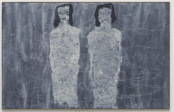Sabi and Kiyo add yet more megabytes to the IDM glut.
Force Intel is a sublabel of Mille Plateaux, the latter's management choosing to found a new imprint as a release platform for the music they consider 'not experimental/artful enough for MILLE PLATEAUX, but just too good not to be released'. 71:36 is their first offering, featuring five tracks from Sabi, and another five from Kiyo – both Tokyo-based musicians. Kiyo makes glitchy electronica, on the ambient end of the scale, whilst Sabi leans toward more obviously ambient compositions using piano and string section orchestration. In his more interesting moments (on 'Om'), Sabi orchestrates with woodwind VSTs.
Although it is soothing, the Sabi material is limited by a composer who is writing music to reflect his own keyboard skills on the piano. There are too many ponderous chords set against atmospheric orchestration. Where electronica musicians choose to go head-to-head with classical composition, a common trait is to write within their playing capabilities. Classical composers do no such thing, assuming that a skilled player will take responsibility for actually converting the notes written on paper into actual oscillations of air. With piano, the obvious culprit is Chopin – considered by pianists to be the most sadistic of composers. His etudes, played at full speed, separate the piano players from the pianists. Speed and dexterity at the keyboard are by no means a measure of compositional worth, no more so than the shred antics of axe-heroes are an indication of good metal. That said, ear-catching moments of dexterity in the Sabi tracks are notable by their absence.
There are too many ponderous chords set against atmospheric orchestration.
Throughout the Sabi material, the piano-led pieces build toward a virtuoso moment which never actually comes, instead there are just more plodding ambient textures and string section massification. Looped beats, orchestration, some piano chords to focus the ear. The unfortunate end result is machine-like coldness, vacuum, absence. It is the background score to the winter levels of some role-playing computer game: perfectly pleasant, vaguely inspirational, but dependent upon a visual aspect which isn't actually there. Without any virtuosity of composition, orchestration, rhythmic programming or a simple, honest groove, the tracks fall into the ever-filling pit of uninspiring electronica which every kid with a laptop and turntable feels is their duty to add to since the launch of Bandcamp.
Recorded music's current crisis is only partly caused by the plague of filesharing. A large part of the problem is that musicians now look upon 'getting it out there' as a legitimate artistic goal. The visual and literary arts are well ahead of music in this – the worthlessness of vanity publishing and self-expression has long been established within those platforms. Recorded music has until recently, always been restricted by the costs of recording, pressing and distribution. Unless it had a chance of breaking even, music did not get to be recorded. Commercial viability is not the most accurate gauge of artistic merit, but it was at least a filter. With that filter removed, we are now in a period of musical incontinence, with the recording of albums becoming the equivalent of dogs pissing on lamposts.
Can we accept this? Can we accept the short orchestral musings of a musician who wants to make a mood-picture
What happened to innovation? To being the first to come up with a new sound, or a new use for an existing sound? The belief that everything has already been done is too often (overtly or subconsciously) used as an excuse for not trying. The Sabi work is slick, well-made and highly-polished, but has nothing which hasn't been done already. Can we accept this? Can we accept the short orchestral musings of a musician who wants to make a mood-picture, but doesn't have the resources to use an orchestra, the patience to practise his piano technique or the vision to compose a piece which has something new to add to the hundreds of thousands of hours of music which already exist? Don't we deserve better than this flaccid blend of Debussy and Vangelis?
The Kiyo material is edgier, although once again, the emphasis is on creating an ambience rather than an actual groove. With a visual element – some projections or live modern dance, this might be a worthy score, but as music in itself, it entirely fails to connect or compel. Worse than that, it fails to intrigue. There are the clicking high-register beats tapping away, following some logical pattern which is clear only to the composer. There are the burbling mid-range chords and melodic loops. There are the bass whomps and whirls. There are the eclectic pots and pans percussive elements and the random earcandy of distorted vocals or string noise mixed just behind the main body of the music. Nothing new there then. Where it fails is in its register. The Richard Devine mix of 'Micropsyche', for example, falls somewhere between the predictable patterns of dancefloor fodder and the obtuse but intriguing randomness of experimental electronica. Unfortunately, it does neither very well.
Worse than that, it fails to intrigue.
The standout Kiyo track is 'Noor (Machinedrum Mountain Eye-Beam Remix)', which manges to add the necessary narrative and groove element to what is otherwise a too widely-mixed track. A nice 808-emulator bassline lifts the piece into something which actually gets the blood flowing to the dance glands. The track is largely without build/drop/breakdown elements, instead doing the techno trick of amassing rhythmic layers to create the tension necessary to drive a dance track onwards. Even so, it's pretty subtle, as are the changes in pitch of the synthwash which fades in and out of the track. It's nice, but has a vague emptiness which is a little irritating. Somewhere in the mixing or mastering, the track is missing punch. It's pleasant, but just never fills the room, never takes the breath away. In the competition for your hard-earned pennies, it is hard to find a reason why this should merit them more than Autechre, Bonobo, Squarepusher, Aphex Twin etc.
And if that seems unfair, that's part of the problem. Make it better than what's already there, or don't make it at all.
Sabi/Kiyo – 71:36 out now on Force Intel
Sean Keenan used to write. Now he edits, and gets very annoyed about the word ‘ethereal’. Likely to bite anyone using the form ‘I’m loving….’. Don’t start him on the misuse of three-dot ellipses.
Divides his time between mid-Spain and South-West France, like one of those bucktoothed, fur-clad minor-aristocracy ogresses you see in Hello magazine, only without the naff chandeliers.
Twitter: @seaninspain













